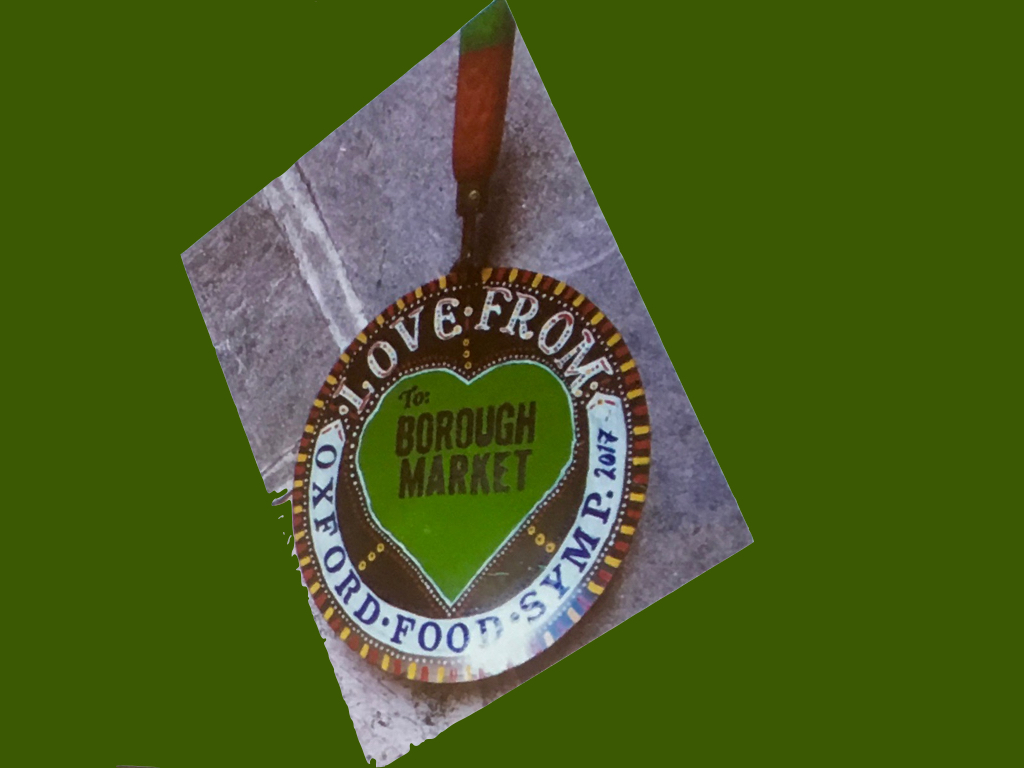TO BOROUGH MARKET, LOVE FROM THE OXFORD FOOD SYMPOSIUM

For over 30 years the Oxford Symposium on Food and Cooking has been convened at the University of Oxford. Each year a group of food obsessed writers, academics, scientists, chefs and food lovers coalesce to spend the weekend discussing food politics and history while never forgetting to intersect the discussions with the sheer joy and love of food.
In 2017 the theme was Food and Landscape, and papers from across the world were shared and enjoyed building on 30 years of accumulated knowledge. Subjects ranged from The Sonic Landscape of Food to Terraced Landscapes: Farming on Balconies to Global Warming and The Changing Global Food Landscape: The Need to Preserve Diversity. And to my utter amazement Agriculture without Fences presented by this writer. I will admit to wondering many times over the weekend why I ever thought that was a good idea in such exalted company. But I reminded myself the critical aim was to ensure the history of Australian Aboriginal land management and food gained the wider global audience it so richly deserves, I hope in some small way I was able to do that.
On Sunday, an old friend reminded what real courage looks like in the face of overwhelming adversity. Traditionally at the Symposium lunches and dinners are themed and hosted by different organisations. Sunday was the turn of London’s Borough Market. When I lived in London, Borough was always a favoured destination. Nearly every week I would hop on the bus and make my way across the river. I loved the drive across London Bridge and the first view of the market nestled under the arches with Southwark Cathedral looming overhead. Borough market has stood on this iconic site for some 1000 years. A millennium of trading surely gives new meaning to the term retail longevity. Stallholders reflect the history of immigration to London from Italy, to France, to Ethiopia, to the West Indies and of course the food traditions of England from cheese makers, fishmongers and butchers. If you aspire to reconciliation, there’s usually nothing like food to pave the way. So, in June like many others, my heart broke when terror found its way to the market. But 11 days was all it took to get the market up and running again. The market was also stoic in honouring its previous commitment to the Symposium, and we all felt humbled to have them there. The Market’s theme was The Ploughman’s Lunch – An Aural Reconsideration. The history of the Ploughman’s is mired in controversy. It is mentioned in various forms and publications notably in Pierce the Ploughman's Crede (c.1394) and later makes its first appearance in the Oxford English Dictionary in 1837, but by the mid-20th century, the classification was high jacked to underscore a marketing strategy in post rationing Britain designed to increase the consumption of cheese. That theme continued in the 1970’s by parties concerned that the UK’s new membership of the EU would cause European cheeses to flood the UK market. Our menu was a revote on culinary reconciliation. Let it not be said you cannot learn from last century or even 2016. The food was an ode to the British field worker's traditional midday lunch converging with some modern day European politics. Unsurprisingly the Union of Bread and Cheese was deemed a winner proving that some things are always just meant to be. The Pudding Alliance used Kent based Chegworth Valley fruit in an Eton Mess married with a Borough patisserie underscoring that the French and the English can work together brilliantly just give them right conditions and the right product. On the counter side of the debate stood the Pickle Independence Party championing all things Yorkshire.
Oxford Food Symposium Ploughman's Lunch menu
Personally, I was up for any pickle that used Black Ale to underpin a treacle and bitter back note to the pickled vegetables. Certainly, I did not miss the ubiquitous pickled onion of 70’s fame. Then again, I am easily seduced by the addition of alcohol to well anything really.
The Raw Milk Democrats championed Stichelton and opened up the debate on pasteurised milk versus non-pasteurised milk for cheese making and the issues of PDOs certification. Read more about the defence of the use of raw milk and the counter argument here.
The raw milk debate is probably best summarised as risk versus pleasure and heritage. Feel free to cast your vote. Just ensure you know the facts and then make your call. Perhaps milk is a metaphor for the whole democratic process?
Nevertheless, the lunch was a triumph of reconciliation and let it never let it be said that a tea towel cannot also make a great napkin. But most of all, I would raise a glass to Borough Market for a thousand years of trading no matter what, and surely we all look forward to the next thousand….







